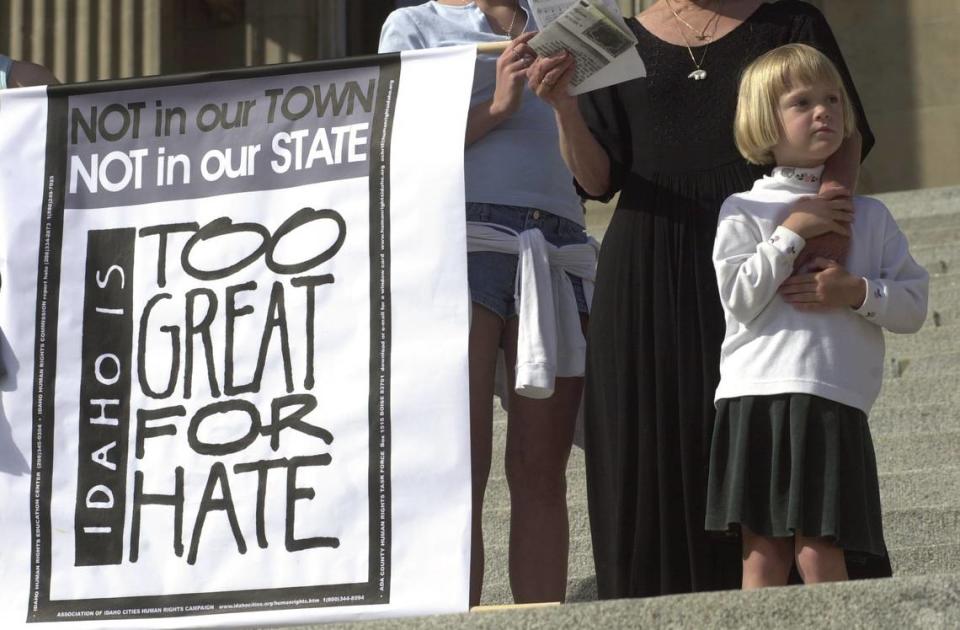‘Too great for hate’ became a resounding Idaho slogan. Where did it come from?
Thirty years ago, the Ada County Human Rights Task Force unveiled a new slogan: “Idaho is too great for hate.”
The saying was a response to a rise in hate crimes, concerns that extremist hate groups could be attracted to Idaho and a proposed initiative that would have barred state agencies from acknowledging homosexuality as acceptable, according to Idaho Statesman reporting from 1993.
The task force launched the Too Great for Hate campaign in a full-page Statesman ad that April, and a week later LGBTQ+ rights activists carried a pink and purple sign bearing the slogan at a national gay rights march.
The saying became ubiquitous, emblazoned on T-shirts, bumper stickers, buttons and more that funded task force projects. Since 1993, it has been a rallying cry against white supremacist presence, racist and antisemitic graffiti, anti-Muslim activism and other xenophobia.
Today, the group that created the slogan no longer exists. Many of the community leaders who led the charge, like task force president and United Methodist Rev. Tom Tucker, task force vice president Gaylord Walls and Idaho Human Rights Commission President Marilyn Schuler, have since died.

But the saying remains a common utterance.
The Ada County Human Rights Task Force disbanded sometime in the 2000s and handed the slogan over to the Boise-based Wassmuth Center for Human Rights. A plaque bearing the saying is mounted at the center’s Anne Frank Memorial, and the organization still sells some placards and posters with the phrase, director Christina Bruce-Bennion said.
“Part of the reason it has staying power and kind of resurfaces is because it has that universal message,” Bruce-Bennion told the Statesman in an interview. “It’s catchy but it was also inadvertently this aspirational idea, and it became something that was bigger than just one issue.”
In 2019 and 2020, then-state Sen. Cherie Buckner-Webb introduced bills to add a “too great for hate” specialty license plate that would benefit the Wassmuth Center and Anne Frank Memorial. Both years it was blocked by Republican lawmakers.
“We were trying to say, ‘Minorities are such a small part of the population. Why not have something that says we’re too great for hate?’” Buckner-Webb told the Statesman in an interview.
She said there was bipartisan support for the legislation, so it came as a surprise that the bills failed.
“We were being purposeful not to bring a political bent to it,” Buckner-Webb said. “It wasn’t about political party, it was about personhood — too great to direct hate to people.”
Bruce-Bennion said legislators’ votes sent a message to Idaho residents.
“I was not in the room where a decision was made (on the bill) so I can’t speak to why it wasn’t approved,” she said, “but in some ways it spoke volumes.”
Bruce-Bennion said Idaho is experiencing a lot of change as it grows, which in turn can create discomfort and fear. Like it was in 1993, the state is grappling with extremism, hate crimes and anti-LGBTQ+ sentiment.
“’Idaho is too great for hate’ is something that, as a state, we need a constant reminder of,” she said. “I think we need to do better.”
Buckner-Webb said the slogan has always seemed “like motherhood and apple pie to me” — something important and all-American that people can rally behind.
She said the parallels between Idaho’s political climate when the phrase was coined and today feel like a step in the wrong direction.
“We’ve seen what hate can do,” Buckner-Webb said. “Idaho’s growing by leaps and bounds, but wouldn’t it be great if we grow together and give each other a bit of respect?”


